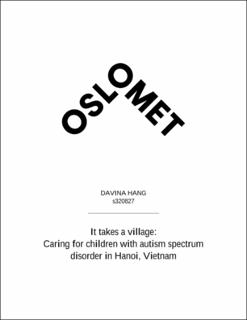It takes a village: Caring for children with autism spectrum disorder in Hanoi, Vietnam
Master thesis
Published version
Permanent lenke
https://hdl.handle.net/11250/3111412Utgivelsesdato
2019Metadata
Vis full innførselSamlinger
Sammendrag
The aim of this project is to better understand parents’ or caregivers’ experiences of care for their children with autism spectrum disorder (ASD) in Hanoi, Vietnam. The research explores parental caregiving practices, identifies the autism services and support parents use, and addresses parental challenges and coping mechanisms for those challenges. It uses a mixed methods approach, with a self-administered questionnaire (n = 89) based on Furnham and Buck (2003) and semi-structured interviews (n = 9) that were analysed using thematic analysis.
The results are groups in three themes around parental care for the child with ASD: 1) centeredness of family, 2) parent’ developmental goals, and 3) social support. These are organized and contextualized within the three components/sub-systems of the developmental niche framework by Harkness & Super (1986). The three sub-systems are the physical and social setting, customs of childcare and child-rearing and psychology of the caregiver.
The findings show that parents use immediate family to seek advice to make inform health decisions about their child. Parents have goals for their children to develop such as eating, toileting, playing, socializing with people, and listening to parents. Their caregiving values and family structure may originate from traditional and historical practices of Buddhism and Confucianism. Their access to social supports is provided by partners, professionals, families, teachers, other parents of child with ASD, books, internet, and television. They experience challenges of access to autism supports and caregiving stress. Their coping mechanisms are seeking multiple supports and providing love for their children so they can grow happily and healthy.
The findings add to the understanding on the relationship between the parent and the autistic child within the social and cultural context of Vietnam, and thus a cross-cultural and global perspective. Parental experiences on caregiving their children with ASD are recommended to be further explored in other regions of Vietnam.
